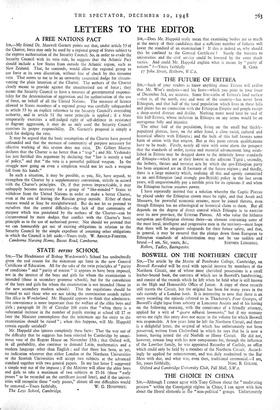THE FUTURE OF ERITREA
SIR,—Such of your readers as know anything about Eritrea will realise that Mr. Wise's analysis—and his fears—which you print in your issue of December 3rd, are accurate. Some five-sixths of Eritrea's land surface —that is, all the north, east and west of the country—has never been Ethiopian, and that half of the total population which lives in these hills and plains has no connection with the Ethiopian Empire and people except a deep-seated distrust and dislike. Nothing more need here be said of this half-Eritrea, whose inclusion in Ethiopia on any terms would be an outrageous folly and injustice.
The other half of the population, living on the small but thickly- populated plateau, have, on the other hand, a close racial, cultural and historical affinity with Ethiopia ; and the bulk of this half favours some form of union with that empire. But at this point certain qualifications have to be made. Firstly, nearly all view with some alarm the prospect that the standards of order, justice and material advancement long estab- lished in Eritrea may be dragged down to the infinitely lower standards of Ethiopia—which are at their lowest in the adjacent Tigrai ; secondly, the bribery, threats and terrorist acts by which the pro-Ethiopian party has been organised are an ill foretaste of the future regime ; and thirdly, there is a large minority which, realising all this and openly committed to an anti-Ethiopian (and strongly pro-British) policy in the last seven years, will unquestionably pay a terrible price for its opinions if and when the Ethiopian faction assumes power.
I have repeatedly insisted that a solution whereby the Coptic Plateau be placed under the Ethiopian crown must be right, and that Assab and Massawa, for powerful economic reasons, must be joined thereto, even though Ethiopia has no ethnological or historical claim to them. But all depends on the degree of direct control which Ethiopia is to exercise over its new province, the Eritrean Plateau. All who value the hitherto outspoken anti-Ethiopian element there—an element containing some of the most loyal, intelligent and progressive men in the territory—must hope that there will be adequate safeguards for their future safety, and that, in general, it may be ensured that the plunge down from European to Ethiopian standards of administration may not be too sudden and














































 Previous page
Previous page